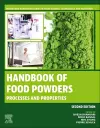
Handbook of Food Powders
4 contributors - Paperback
£215.00
Min Zhang performed two periods of postdoctoral research from 1992 to 1997. He is currently the key professor and PhD supervisor in the School of Food Science and Technology, Jiangnan University. He is the director of R&D, Center of Food Resource and Utilization Technology in Jiangnan University. His research areas focus on the mechanism, technology, and engineering of processing and storingfresh foods.Professor Zhang has been approved as a master’s supervisor and has supervised 105 master ’s students (of whom 96 graduated) since 1998. Since 2000, he has beenapproved as a PhD supervisor and has supervised 42 PhDs (of whom 31 graduated). Professor Zhang began to supervise postdoctoral researchers in 2004 and has super-vised 6 postdocs. In 2003 and 2005, he was listed in Who’s Who in Science and Engineering. In 2004, he was listed in the first batch of the National Personnel Training Project of the New Century Bai-Qian-Wan Project. In 2006, he was listed as a National Expert and was entitled to special government allowances. In 2005, he was invited as the scientic adviser in the food science by the International Foundation for Science (IFS). From 2007, he has been listed as early or late listed as the editorial member of three SCI journals (Journal of Food Engineering, IF2.576; D r yi ng Tech n olog y, IF1.77; International Agrophysics, IF 1.142) and several domes-tic journals, such as Journal of Food Science and Biotechnology, Journal of Food Safety and Food Quality,and Drying Technology and Equipment. In August 2013, he was appointed as an honorary professor in the eld of food science by the University of Queensland, Australia.In recent years, Professor Zhang has actively promoted the industrialization of new quality control technology in fresh food processing and preservation and has established a longtime collaboration mechanism of Industry-Academia-Research (joint research institute) with more than 10 large- and medium-sized domestic and foreign food or equipment companies like Haitong Food Group Co. Ltd., PepsiCo Food Co., and Jiahao Food Co., which created obvious economic benets for the enterprise.Professor Zhanghas published 26 monographs or translated books in national presses and 10 English book chapters, edited one international conference proceed-ings (English edition), and coedited one English academic book. He has published more than 240 SCI international journal papers as a corresponding author. About 116 applied invention patents from his group (with him as the main inventor) have already been authorized by the Chinese National Intellectual Property Bureau. He has also applied for 11 international patents, including patents from Germany, Japan, France, South Korea, and Switzerland. He was recognized as the fth of the top ten outstanding patent inventors in Jiangsu Province (China) in 2012. The projects carried out by Professor Zhang have been granted more than 10 awards by government and professional associations, including an award from the national government (second prize for the National Scientic and Technological Progress Awa rd, 2012), an award from the government of Jiangsu Province (rst prize for the Province Scientic and Technological Progress Awa rd, 2009), two awards from China General Chamber of Commerce (rst prize for the National Commerce Scientic and Technological Progress Award, 2009, 2011), an award from China National Light Industry Council (rst prize for the National Light Industry Scientic and Technological Progress Awa rd, 2007), and an award from China National Food Industry Association (rst prize for the National Food Industry Scientic and Technological Progress Awa rd, 2011). Bhesh Bhandari has been associated with the University of Queensland for more than 22 years. His research is mainly focused on food materials science, includ-ing microencapsulation of food ingredients and glass transition–related issues in food processing and product systems. Various microencapsulation processes, such as spray drying, molecular encapsulation, cocrystallization, precipitation, and gel entrapment, have been investigated by his research team. Professor Bhandari’s cur-rent research focus has been to relate the nanostructure of food systems to their bulk properties. He has developed a continuous method to produce microgel particles that can be used to encapsulate various functional ingredients and pharmaceutical drugs. He has performed a number of pioneering studies on the stickiness issues of food powders encountered during drying and handling. Recently, he developed a patented technique to produce an ethylene powder that can be used for fruit ripening as well as control of other physiological functions in plants. Professor Bhandari has authored more than 200 papers, including 30 book chapters. He has coedited Food Materials Science and Engineering and Handbook of Food Powders, which have been pub-lished recently. Professor Bhandari is an editor of The Journal of Food Engineering. Zhongxiang Fang earned bachelor (1993) and MPhil (2003) degrees in agricultural processing and storage engineering at the China Agricultural University and a PhD (2007) in food science at Jiangnan University, China. He was a lecturer at Zhejiang University, China, from 2007 to 2009 and moved to Australia in 2009 as a post-doctoral research fellow at the University of Queensland. Dr. Fang was appointed as a Curtin Research Fellow in the Food Science and Technology Program, School of Public Health, Curtin University, in 2012. From 2016, he worked as a lecturer in food processing in the Faculty of Veterinary and Agricultural Sciences, The University of Melbourne. Dr. Fang has secured research funding of about 1.7 million AUD, published more than 100 peer-reviewed papers, and has 9 patents. He has (co-)supervised six PhD students and ten m a s t e r ’s students. He has served as a reviewer for major journals in associated elds. His research interests include the effect of climate, environment, and food processing technology on food quality and safety; antioxidant activity and metabolism of plant polyphenols; food processing technol-ogy and food engineering; and encapsulation of food bioactives and bioactive lms in food coating and packaging.